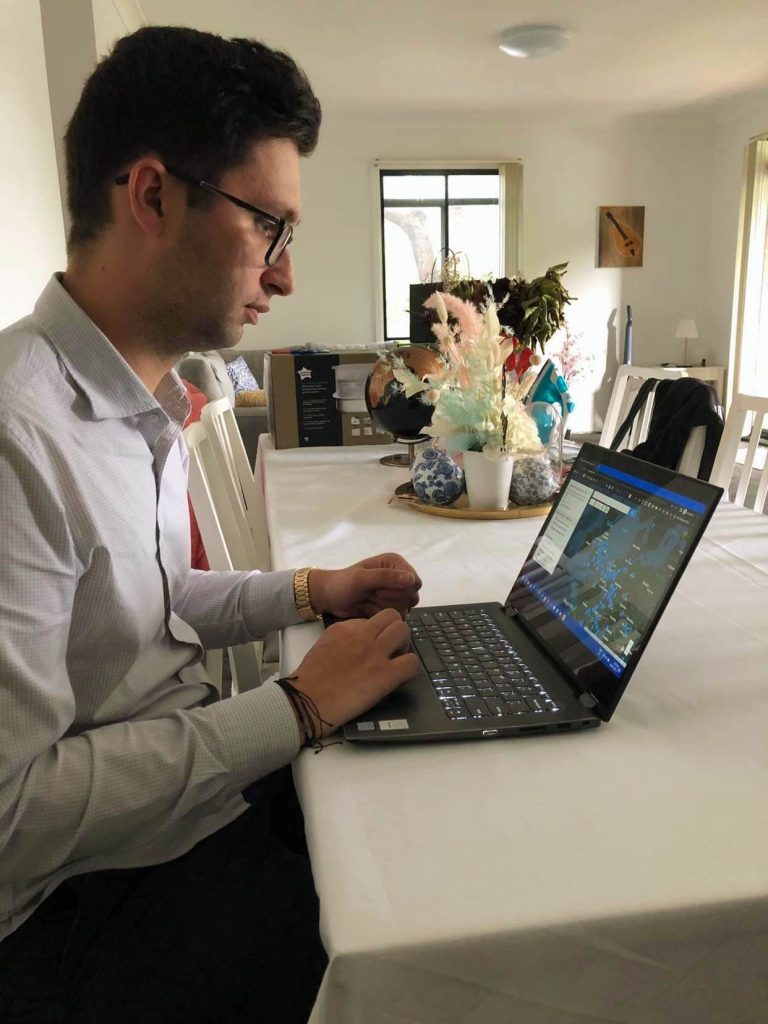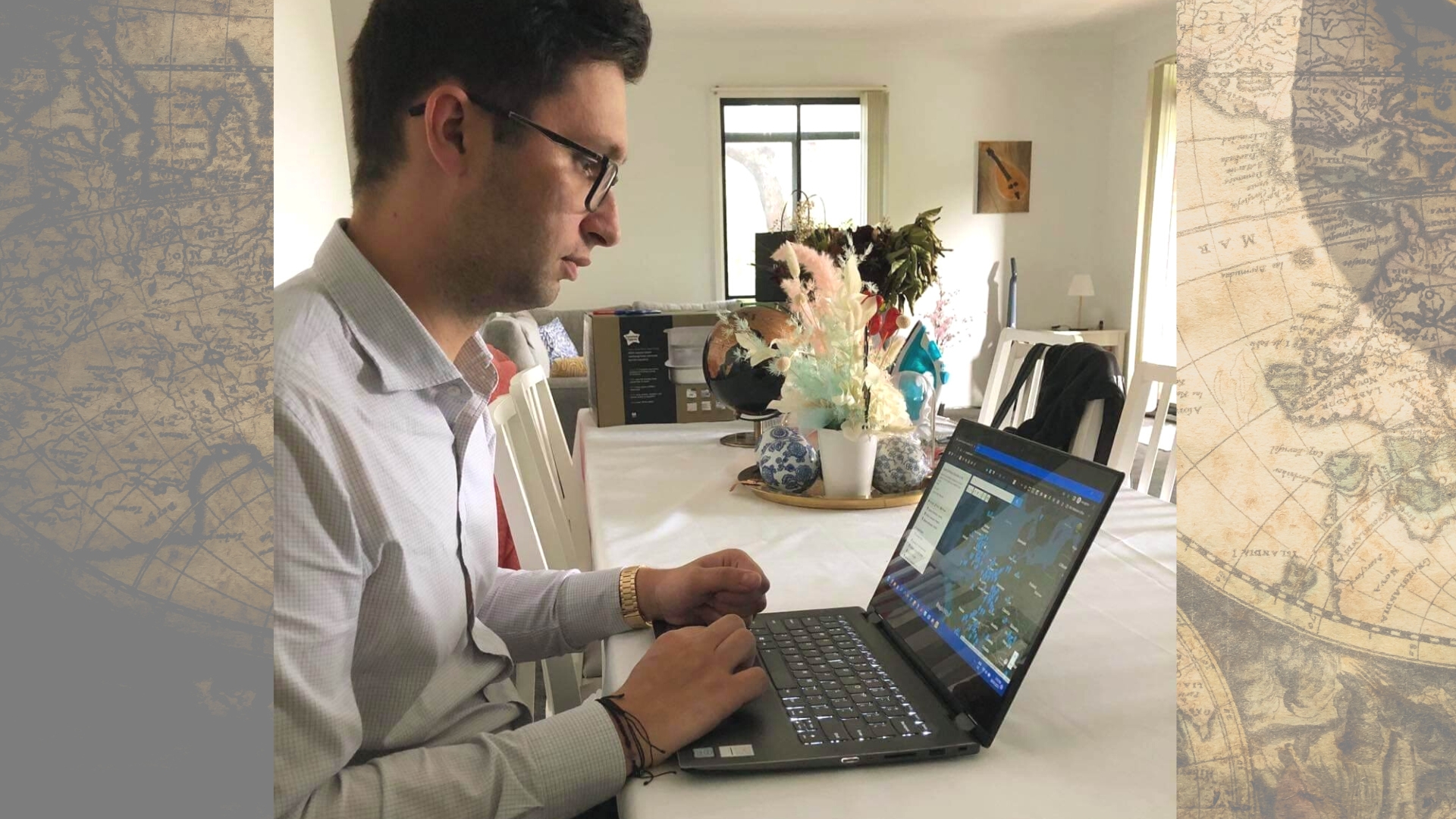By Mary Sinanidis
There are 172 Greek churches in Australia (including Father Lefteri’s church in Dromana), up from 163 in 2021. In the world there are more than 1,300 parishes outside Greece and Cyprus. We know this because of the work of Costa Dantos, a 24-year-old urban planner from New South Wales, who had a fascination for mapping cities, settlements, associations and more from a very young age.
Mapping the Greek churches of the world is the result of a two-year process, which Mr Dantos told The Greek Herald has been “exhausting and fun” and took up most of his weekends. But he persevered and created the only existing church mapping source covering more than one country. He said there are countries without a list of churches, a problem now rectified thanks to his research.
“It was not easy mapping every church and monastery in the world today. I had technological glitches along the way where I sometimes lost two hours worth of work and had to start over, but luckily I know geography very well or it would have been almost impossible. Plus, I learnt a few languages along the way,” he said, adding his efforts to learn the words Archdiocese, Greek, Orthodox and Church in most European languages.
“Some (of the church lists) were outdated, and some dioceses didn’t really have a website. I had to check through mapping sources, even on aerial images through large sections of cities just to spot a Greek church, find it on the map and get a photo of them all to make sure it was the right one.
“Some I looked up through journal articles, others through reports, others I found through Facebook pages written in foreign languages where I scoured for ages just for a picture of their church.”
It was tedious and time-consuming but COVID-19 lockdowns worked in his favour, offering ample time for research. He was rewarded with several realisations.
“One of the most eye-opening things I found through this project is that Greeks are truly everywhere, except for Antarctica. And there’s a Greek diaspora even in countries that do not promote or support multiculturalism much. Even in those countries, Greeks still hold our flag with pride,” he said, pointing to Zambia, the Democratic Republic of Congo, Venezuela and Cambodia to name but few.
The project brought together five of Costa’s passions: urban planning, geography, history, demographics, and Hellenism.
“I noticed very interesting things from a planning perspective,” he said.
“Greeks in the United States generally have larger churches than other countries on larger land areas. In American suburbia, everything is built bigger with huge gardens and ample sized parking lots.

“Many of their churches have domes and built structures like Hagia Sophia as many parishioners are from Asia Minor and create designs resembling those of Smyrna. This is different to Australia where many churches have bell towers on either side of the front church facades. I believe this is more the modernist and Catholic architectural style.”
A Greek church, Mr Dantos said, is telling of the people who built it.
“Many churches around the world, where there are people with island heritage (nisiotes), are painted in blue and white, whereas communities of Macedonian Greeks use stones as one of the features,” he said.
“Northern European churches often have Gothic elements as some countries don’t offer government benefits for churches without traditional Lutheran and Gothic-styled architectures.”
Greek flags are typically hoisted alongside those of the host country of the churches in Australia, Canada and most of the United States, whereas Greek churches in Turkey are fortified behind big walls for privacy and protection.
“Many Turkish and Albanian churches were built in the 1500s way before other diaspora communities,” Mr Dantos said.
The names of churches are also interesting with many dedicated to patron saints of parishioners’ homelands with Macedonians opting for Saint Demetrios and Saints Cyrillos and Methodius, whereas Kytherians opt for St Elessa, and Saint Dionysios for Zakynthian clusters, etc.
Mr Dantos included all Greek churches he could find based on whether the priest or most committee members had Greek names, which was frequently the case for Scandinavian countries.
The interesting facts are posted on Dantos’ website which not only maps churches but other interesting community clusters: including Greek settlements in Turkey in the 1900s, non-Greek Orthodox places of worship in Greece and Cyprus (eg pagan, Jehovah’s Witnesses, Jewish synagagues etc), and even his university thesis of Greeks in Newcastle and how cultural infrastructure helps retain the Greekness of a population.
Two years ago, his maps of Greek churches in Australia went viral. There was even some local controversy as parishioners complained when they didn’t see their church.
“I haven’t posted churches which hold services in buildings not solely used as Greek Orthodox Churches,” he said.
Since his launch of the Australian maps two years ago, he has become engaged and will soon be a father.
“I spend a lot of time on my maps,” he said. “My fiancé is supportive though sometimes she complains that I lose track of the time once I start mapping because I can’t get off as I have to finish things off once I start.”
While many of the maps Mr Dantos offers are free, others come at a small cost for his hard work.
“The maps which killed me to do and took over all my weekends include an unlocking fee, and the easier ones are free. I hold them with lots of love and I want to share those with more personal meaning to me with people who would really want them,” he said.
“That being said, I’ve also allowed for free access to some of the harder ones, including the Greeks in Turkey (Asia Minor and Thrace) as a service for all Greeks and Philhellenes interested in researching these areas. There’s also a list of Greek associations and organisations in Sydney too!”
Among the listed Sydney’s organisations are those which Mr Dantos is involved with. He is the Secretary of two Greek associations, the President of another and sits on the committee of several others.
Costa Dantos’ maps and other interesting content can be found at My Maps and Reports | Costa Dantos Project (coostad.wixsite.com)

